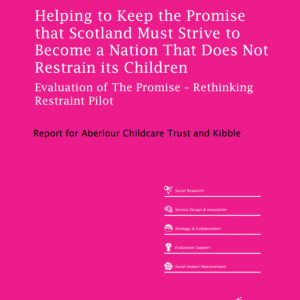Partnership delivers Promise pilot on reducing restraint

Aberlour and a group of charities and councils working in the child and youth care sector have reaffirmed their commitment to The Promise through a pilot programme aimed at reducing the use of restraint in care settings.
Aberlour Children’s Charity was appointed as the lead partner on the initiative with Kibble joining as a supporting partner in the early stages. Both organisations embarked on the initiative aimed at reducing the use of physical restraint where safely possible in children’s care services – one of the founding principles of the landmark 2020 Scottish Government pledge.
Both organisations recognise that restraint should be used as a last resort with trauma-informed, reflective practices continuing to form the basis of culture, service-design and care provision.
In addition to Aberlour and Kibble, another four partners were invited to join the evaluation group. After a rigorous selection process involving 19 organisations, the charities identified Glasgow City Council, City of Edinburgh Council, North Lanarkshire Council and St Philip’s School to collaborate on the delivery of the project.
All appointed organisations involved were already on a journey to reduce restraint in their services, with The Promise funding helping to facilitate the sharing of effective practice, knowledge and research.
Central to the project were the views of young people, care staff, Promise Development Workers and Leadership teams to ensure a comprehensive evaluation, and a subsequent report, The Promise – Rethinking Restraint, has been published today (30 May).

Jim Wallace, Director of Children and Families at Aberlour, said: “It has been our privilege to work alongside Kibble on keeping the Promise that Scotland becomes a nation that does not restrain its children.
“Through our work with Glasgow, Edinburgh, North Lanarkshire and St Philip’s School, we supported them to continue to develop their efforts to engage distressed children in residential care differently without having to use physical restraint. The children and staff who contributed to our evaluation advocated strongly that restraint does not have a place in residential care in Scotland, which mirrors the respective efforts of Aberlour Children’s Charity.
“We have shown that change is possible, even when it has felt unlikely. If we support staff differently to use their relationships with children to help them when they most need it without resorting to unnecessary restraint, create space for the staff to feel safer and develop cultures where restraint doesn’t exist then a new future for care in Scotland will not only emerge, but be sustained.
“I want to thank our colleagues in Kibble and our four partners. But most importantly I want to thank all of the children and young people who contributed to our evaluation. The findings in this report are not an ending but provide many helpful considerations that other organisations in Scotland can take forward to transform culture and practice.
“When this happens, I believe that Scotland will have kept the Promise and becomes a nation that does not restrain its children”.

The research project was conducted by the Social Value Lab, with a number of research methods being used, including the use of vignettes and semi-structured interviews with young people to gain valuable insights in a sensitive manner.
The research followed the Scottish Approach to Service Design – a framework developed by the Scottish Government which aims to create public services that are more effective, efficient, and responsive to the needs of the people they support.
Sinclair Soutar, Kibble’s Chief Operating Officer, said: “This was an important piece of partnership working across public and third sector organisations, which underlines the collective ambition and drive to meet the recommendations made in The Promise.
“By working together, and hand in hand with young people, we have been able to amplify the voices at the heart of this work and share best practice, research, knowledge and insights to meet the needs of young people and deliver change across the sector.
“Of course, this project does not sit in isolation and sits within a wider context of understanding and responding to the needs of young people affected by trauma. This involves promoting shared understanding, building positive relationships, developing staff training, culture and working alongside families.
“While we have taken good strides forward at Kibble, we will continue to learn and develop to improve care experiences for young people. Working closely with other providers on this important matter has also provided us with rich learning to reflect on.”
Funding for the initiative was provided by the CORRA Foundation’s Promise Partnership Round One Diagnostic Route.
Fraser McKinlay, Chief Executive of The Promise Scotland said: “The Independent Care Review was clear that Scotland must strive to become a nation that does not restrain its children. It’s great to see the work being taken forward by Aberlour and Kibble, funded by the Promise Partnership, and the progress they are making in this really important area.
“The Promise Scotland is pleased to have played its part, supporting the teams who are working to make physical restraint a thing of the past for Scotland’s children and young people.”
Kathy Henwood, Service Director Children and Justice Services at City of Edinburgh Council said: “The City of Edinburgh Council residential services have been privileged to work alongside Aberlour, Kibble and The Promise design team to better understand and design care that moves away from the need for restraint.
“This report captures the work undertaken, the outcomes achieved and the ambition for the future, reaching for a Scotland wide position of no restraint.
“The voices and experiences of people with lived experience have been central to informing this work, and through these voices, change across systems, culture and ambition have occurred.
“The City of Edinburgh Council supports the conclusions set out in the report and the learning and commits to progressing this approach within our own services.”
Susan Orr, Glasgow City HSCP, Head of Children’s Residential Services said: “I’m delighted we have been able to participate in this innovative pilot that is perfectly aligned with one of the main aims of The Promise.
“In Glasgow, we are always striving to improve the lives of our children and this project helps us to achieve that as well as supporting our staff to deliver the best care possible for children and young people”.
Lynne McKerley EFM Education & Families North Lanarkshire, said: “In North Lanarkshire, we fully embrace the report and the pilot program, and our experience has been highly positive.
“Our commitment to removing restraint in our children’s houses has yielded remarkable progress. Through a focus on preventative strategies, trauma-informed practices, and early intervention, we have significantly reduced the use of holds and restrictive measures.
“Our training and courses now prioritise building relationships and diversion, rather than relying on holds. We have taken a significant step forward by discontinuing the use of the ‘prone hold’ in all our children’s houses since January 2023.
“Our goal is to steadily progress and become an authority that no longer employs restraint or restrictive practices in our residential children’s houses by the end of 2024.”
Robert Latta, Assistant Director of Services, St Philip’s School said: “St Philip’s School hope that the report will inspire and inform practitioners and providers of care to join us on the journey to “Scotland becoming a nation that does not restrain its children”, learning from our shared experiences.
“Our project focused on staff following a restraint, reviewing processes of staff self-reflection, staff well-being and its impact.”